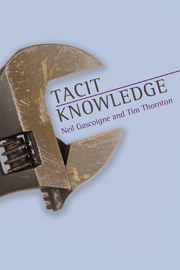5 - Second natures
Summary
INTRODUCTION
Drawing on two clues from Michael Polanyi – that “we can know more than we can tell” and that knowledge is an “active comprehension of things known, an action that requires skill” – and on arguments for the priority of practical knowledge from Ryle and Heidegger, we have argued for a conception of tacit knowledge as a context-dependent, conceptually structured form of personal or practical knowledge. In Chapter 2, we attempted to draw the sting of a recent “intellectualist” backlash by accepting that, like knowledge-that, practical knowledge has a content even as we defended the (Rylean) argument supporting its priority. This gives rise to a conception of tacit knowledge that deserves the label “knowledge” because of its content and “tacit” because it runs counter to what we called the principle of codifiability:
PC All knowledge can be fully articulated, or codified, in context-independent terms.
In Chapters 3 and 4 we examined and rejected a number of possible routes towards a more radical conception of tacit knowledge drawing on both Wittgenstein's rule-following considerations and responses to it which deploy the notion of a background. These run counter to both PC and the principle of articulacy:
PA All knowledge can be articulated, either in context-independent terms or in context-dependent terms.
That is, in related but differing ways, they subscribe to the claim that:
PI There can be knowledge that cannot be articulated.
- Type
- Chapter
- Information
- Tacit Knowledge , pp. 133 - 166Publisher: Acumen PublishingPrint publication year: 2013

